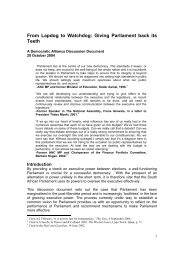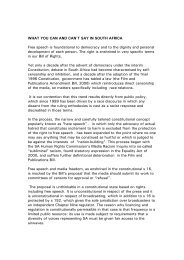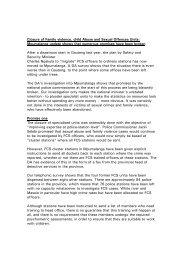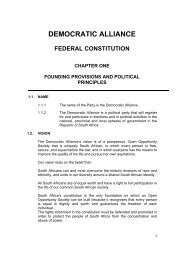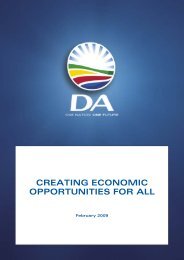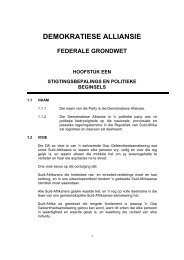DA's Plan for Growth and Jobs - Democratic Alliance
DA's Plan for Growth and Jobs - Democratic Alliance
DA's Plan for Growth and Jobs - Democratic Alliance
You also want an ePaper? Increase the reach of your titles
YUMPU automatically turns print PDFs into web optimized ePapers that Google loves.
Inefficient resource allocation: Resources cannot be allocated to maximiseproductivity <strong>and</strong> output when incentives favour political preferencesReduced innovation: Innovation requires the freedom to experiment, which is rarein large bureaucratic state-run companiesReduced competition: SOEs typically dominate their respective sectors, whichundermines competition <strong>and</strong> increases prices <strong>for</strong> consumersPoor corporate governance: Introducing political considerations into how firms arerun undermines oversight by boardsHeightened corruption: Their proximity to the state means state entities can easilybecome sources of patronage <strong>and</strong> corruptionThe most significant weakness of the state capitalist model, however, is that it fundamentallyundermines liberty. By turning companies into organs of government, the modelsimultaneously concentrates power <strong>and</strong> corrupts it. Whereas in a liberal economy, privatelyownedentities act as a check on the power of the state, state capitalism instead channels allpower to the centre. This removes an essential layer of accountability.A pragmatic viewA preferable approach – the one promoted by the DA – views the state as having animportant role to play in the economy by providing an environment conducive to growth,including the provision of critical infrastructure; enabling economic participation <strong>for</strong> thosefrom disadvantaged backgrounds through education; ensuring transparency <strong>and</strong>en<strong>for</strong>cement of ownership rights; creating a stable <strong>and</strong> predictable regulatory environment;correcting market failures; reducing the transaction costs of participating in the economy;<strong>and</strong> promoting South African firms <strong>and</strong> entrepreneurs on the global stage.This approach sees one of the primary causes of South Africa’s economic failure over thepast 18 years not in the overall approach, but much rather in poor governance <strong>and</strong> failure ofdelivery.Our approach has many similarities with the pragmatic <strong>and</strong> successful policies pursued bycountries with open, market-oriented economies such as Brazil <strong>and</strong> Mauritius, rather thanthe solidly statist policies of Russia <strong>and</strong> China (though the latter is, in fact, liberalising to agreater extent than its fans, including those in the ANC, typically acknowledge). Ourapproach underst<strong>and</strong>s that there are certain activities <strong>and</strong> functions that the state mustnecessarily per<strong>for</strong>m, but that in many areas these functions can be enhanced via injectionsof private sector funds <strong>and</strong> expertise.Two examples illustrate this particularly well. First, Brazil has pioneered, with great success,the model of ‘the state as minority shareholder’ which essentially replaces direct governmentownership with indirect government ownership <strong>and</strong> swaps majority <strong>for</strong> minority holdings byacquiring shares in a broad spectrum of different companies. This approach brings with it anumber of benefits, including:Limiting potential abuse of power by the government of the day. Privateshareholders have enough say in the running of the erstwhile SOEs to prevent theseentities from becoming vehicles <strong>for</strong> rent-seeking or patronage politicsProviding access to capital through the state that companies may not otherwise beable to comm<strong>and</strong> in the market. This allows them to invest more in productivityboostingcapital equipment, <strong>and</strong> ultimately increase returns on their assets.Bringing private sector management expertise into the running of <strong>for</strong>mer SOEsaddresses their lack of competitiveness, poor corporate governance <strong>and</strong> inefficientresource allocation29 | P a g e




